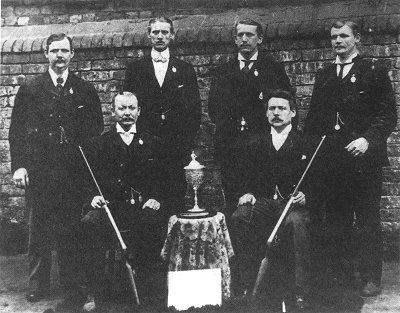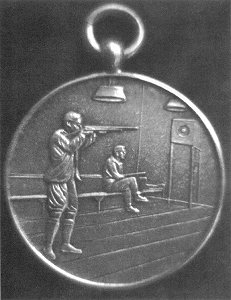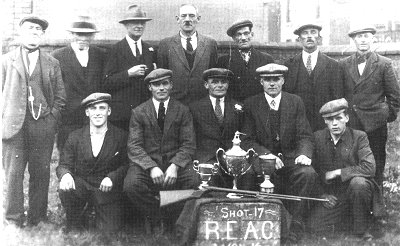BELL TARGET SHOOTINGSOME TEAMS AND PEOPLE
The Black Country could boast of a full team of six brothers, all shooting from the Newport Arms, Pleck Road, Walsall. This was a National record at the time their photograph was taken in 1904, where they are shown with the National Air Rifle Association Trophy, the Mackie Cup. They could perhaps have had fielded three reserves from the same family of nine brothers. Mr. Norman Kendrick of Wolverhampton, now 89, well remembers the shooting prowess of his late father George Kendrick (standing second left in the picture), and his ability to use his target air rifle on rabbits and small game for the stew pot, in the fields around the Bentley farm where he was born. One of the brothers, Fred, emigrated to the U.S.A. to found a firm of engineers in Pittsburgh. Walsall Air Rifle League emphasised their competitive ability in a challenge match with the Walsall Army Territorials in 1909. This was the first time that the match participants used each other's rifles and at the distance each was used to firing. It is interesting to note that four of the Kendrick brothers had two shooting places in each team. The first series, with the air rifle at 6 yards, was won by the League by 19 points. The second series, shot with .22 calibre miniature rifles at a distance of 25 yards on the range in Wolverhampton Road, Walsall was again a victory for the air gunners with a margin of 34 points,. The Individual and the Earl Roberts' merit medals were won by J. Hykin for the Territorials and T. Sadler, for the League, each scoring 142 out of a possible 145. Mr. N Hirst, who now worked for the ("Sporting Mail"), refereed both matches and must have been delighted to see the result which was more in keeping than earlier encounters between the rifle shooting factions. Six years later would see both the contesting Walsall match shooters engaged in a far more serious contest in France, wearing the badge of South Staffordshire on their uniforms. How many of these men left their names on War Memorials, or returned home grateful for the skill and experience acquired in the friendly shooting matches?
Albert's shooters from the Exchange were a team to be reckoned with. They had won match after match. Medals swinging on their watch chains put the frighteners on the opposition before a trigger was pulled. Home or away, the Exchange were seemingly invincible in the local leagues and Albert, with his younger brother Harold, was a top man. With the inevitable flat cap and scarf, they would sally forth and do battle with the opposition in other parts of this mining and industrial district, and to sample the home brews in the pubs at that time, before they returned to the Exchange. Mr Thomas, the landlord of this famous shooting public house, situated on the Watling Street at Bridgtown, looked upon the team as "his boys" and as more than a match for the miners who came from the other side of Cannock towards the Chase, Norton Canes, and Rugeley. However there were rumblings from down the A5 of a team of ladies from Brownhills, who had not only taken up this preserve of the male pub shooters, but had the audacity to enter the leagues. This information soon spread to the airgun teams in the area and indeed, when Mr. Thomas was asked if he believed in clubs for women, he replied "Yes, when kindness fails". It had to happen. The Brownhills Ladies had a point to prove and the match was arranged. Albert, who worked at Hawkins Tiles, Bridgtown, was viewing the coming occasion with a little trepidation: should they beat them out of sight or extend the hand of chivalry? When he returned to his house in New Street, Bridgtown, his mind was made up. A photograph, taken in 1930, shows the team's proud record: 17 matches shot, 16 won - the only defeat was by the team of Annie Oakleys, the Brownhills Ladies!
This was during the years when men were men and the ladies were not to be beaten; and even if it is on record that the Royal Exchange Airgun Club lost this particular encounter, it was a day when the real winner was the sport itself. Albert went on to win more awards, and one of his medals, showing a shooter in action, is pictured here. It was won around 1932, the event being a charity match that was shot over a week of competitions. Owing to the betting on individuals and matches that crept in some years later, Albert gave up the sport on principle, though it was hard to leave a pastime that had given him and his mates so much pleasure. |



